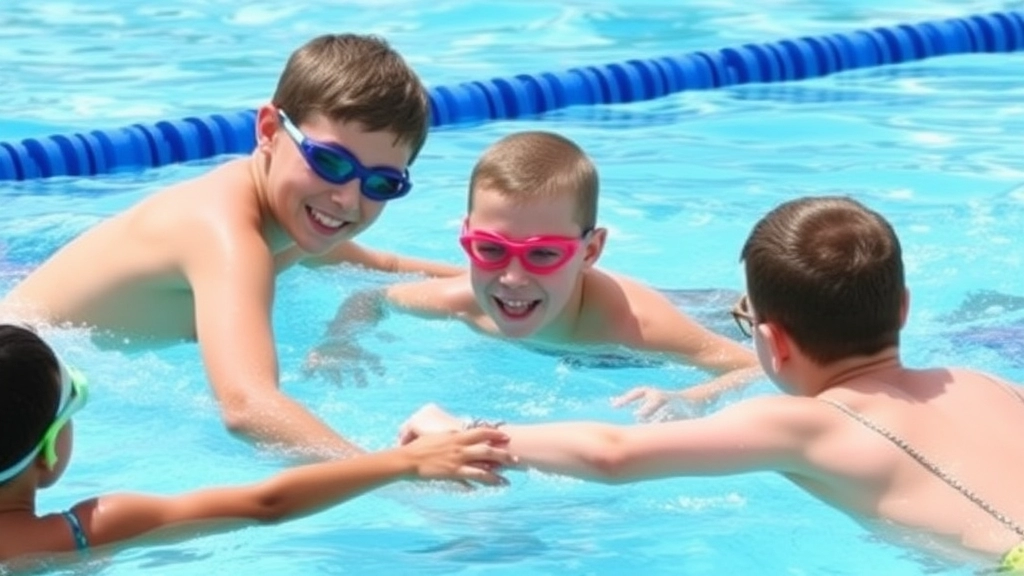Summer Swim Camps
Summer swim camps offer a unique blend of fun, skill enhancement, and lifelong memories for young swimmers. This article explores the various types of summer swim camps available, from competitive to recreational and specialized options, catering to different needs and goals. We’ll delve into the benefits of attending these camps, such as improved swimming skills, physical fitness, social development, and increased independence. Whether you’re aiming for the Olympics or just want your child to enjoy a safe and fun summer, there’s a swim camp tailored to your needs.
Choosing the Right Swim Camp
Choosing the right swim camp can be daunting, but we’ve got you covered with tips on how to make the best choice, including what to look for in a camp and how to budget for it. We’ll also highlight some of the top summer swim camps in the USA, what to pack, and what a typical day at camp looks like. Safety measures and protocols are thoroughly discussed to ensure peace of mind for parents. Finally, we’ll share testimonials from past campers and offer advice on preparing your child for this exciting adventure.
Dive In!
Discover everything you need to know about summer swim camps!
Types of Summer Swim Camps
Alright, let’s dive in (pun intended) and talk about the types of summer swim camps. If you’re a parent or a young swimmer, you’re probably wondering, “What kind of swim camp should I choose?” It’s a legit question, and trust me, the options can be overwhelming. But don’t sweat itâI’ve got you covered.
Competitive Swim Camps
First up, we’ve got competitive swim camps. These are the real deal for young swimmers who are looking to up their game. Think of these camps like boot camps but with more chlorine. They focus on:
- Technique: Perfecting those strokes, turns, and starts.
- Endurance: Building stamina through rigorous workouts.
- Speed: Drills that make you faster than a speeding bullet.
If your kid dreams of breaking records, this is where they need to be.
Recreational Swim Camps
Next, let’s talk about recreational swim camps. These are more laid-back and focus on the joy of swimming. Perfect for kids who:
- Love the water: But aren’t necessarily looking to compete.
- Want to learn: Basic swimming skills and water safety.
- Enjoy other activities: Many of these camps offer a mix of swimming and other fun stuff like arts and crafts or hiking.
Specialised Swim Camps
Now, if you’re looking for something a bit more niche, there are specialised swim camps. These camps focus on specific aspects of swimming or cater to particular groups. For example:
- Stroke-specific camps: Want to master the butterfly or backstroke? These camps zero in on one stroke.
- Age-specific camps: Tailored for different age groups, ensuring the training is age-appropriate.
- Disability-friendly camps: These camps offer specialised training for swimmers with disabilities, ensuring everyone gets a chance to shine.
Family Swim Camps
And let’s not forget family swim camps. These are a blast if you want to make it a family affair. Imagine:
- Parents and kids: Learning and swimming together.
- Bonding time: Through various water activities.
- Family-friendly activities: Outside of swimming, like BBQs and campfires.
Real Talk: What Are You Looking For?
So, what’s your goal? Are you aiming for the Olympics, or do you just want your kid to be safe and have fun in the water? Answering this will help you narrow down your choices.
Quick Recap
- Competitive Swim Camps: For the future Michael Phelps.
- Recreational Swim Camps: Fun and learning without the pressure.
- Specialised Swim Camps: Focused training for specific needs.
- Family Swim Camps: Make it a family adventure.
For more detailed information on the various summer camps available, you might want to check out our ultimate guide to summer camps in Fayetteville, AR. If you’re interested in learning about the costs associated with these camps, our comprehensive guide on summer camp costs can provide valuable insights.
Benefits of Attending a Summer Swim Camp
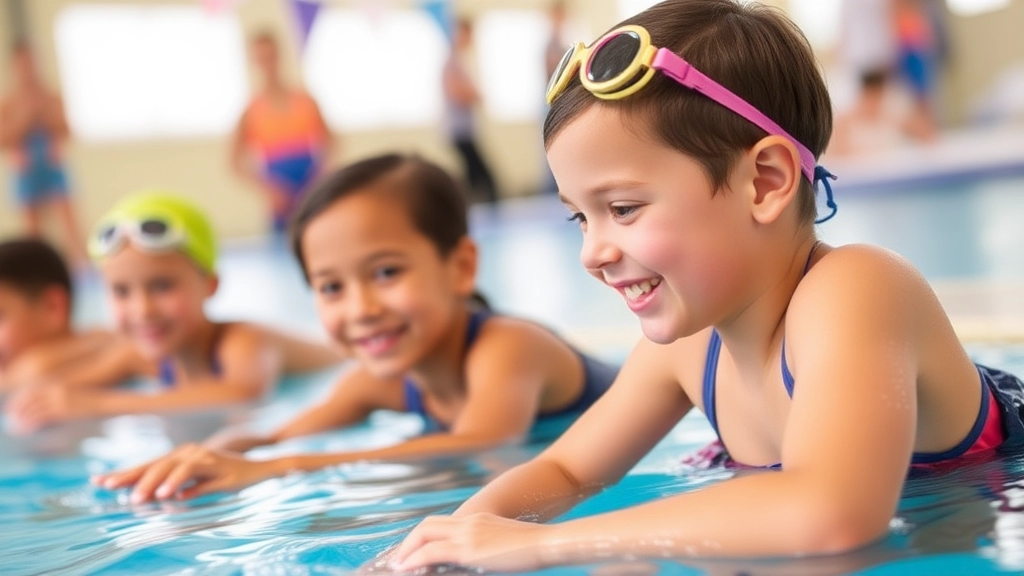
Why Should Your Kid Go to a Summer Swim Camp?
Ever wondered if a summer swim camp is worth it?
Let’s dive into the benefits.
1. Skill Improvement
Your child will level up their swimming skills.
- Intensive Training: Daily sessions with professional coaches.
- Technique Focus: From strokes to starts and turns.
2. Physical Fitness
Swimming is a full-body workout.
- Strength & Endurance: Builds muscle and boosts stamina.
- Cardiovascular Health: Great for the heart.
3. Social Skills
Kids make friends and learn teamwork.
- New Friendships: Bonding over shared interests.
- Team Spirit: Working together towards common goals.
4. Independence
Being away from home teaches responsibility.
- Self-Reliance: Managing their own schedule and belongings.
- Confidence Boost: Trying new things in a supportive environment.
5. Fun & Adventure
It’s not all about hard work.
- Fun Activities: Games, relays, and maybe even a water slide.
- New Experiences: Exploring new places and activities.
6. Mental Toughness
Swimming builds resilience.
- Overcoming Challenges: Pushing through tough workouts.
- Focus & Discipline: Staying committed to goals.
7. Expert Guidance
Learn from the best.
- Professional Coaches: Tips and tricks you won’t get in regular lessons.
- Personalised Feedback: Tailored advice to improve performance.
8. Lifelong Skills
Swimming is a life skill.
- Safety: Knowing how to swim can save lives.
- Hobby for Life: A sport they can enjoy forever.
9. Academic Benefits
Yes, really.
- Improved Focus: Regular exercise boosts brain function.
- Time Management: Balancing camp activities with rest and fun.
10. Memories
The camp experience stays with them.
- Unforgettable Moments: Stories they’ll tell for years.
- Personal Growth: Experiences that shape their character.
How to Choose the Right Swim Camp
So, you’re thinking about sending your kid to a swim camp, but you’re not sure where to start? You’re not alone. Choosing the right swim camp can feel like a big decision. You want your child to have a blast, improve their skills, and stay safe. Let’s dive into the essentials.
What Do You Want from a Swim Camp?
Before you start Googling, ask yourself a few questions:
- What are your child’s swimming goals? Are they just starting out, or are they looking to compete?
- How far are you willing to travel? Local camps might be more convenient, but a renowned camp might be worth the trip.
- What’s your budget? Swim camps can vary widely in cost.
Types of Swim Camps
Swim camps aren’t one-size-fits-all. Here’s a breakdown:
- Technique-Focused Camps: Perfect for refining strokes and improving form.
- Competitive Camps: Ideal for those eyeing the podium.
- Specialised Camps: Some focus on specific strokes or skills, like butterfly or diving.
- General Camps: A mix of fun and learning for all levels.
Research and Reviews
Look for camps with solid reputations. Check out:
- Testimonials and Reviews: What are past campers and parents saying?
- Coach Credentials: Are the coaches experienced and certified?
- Safety Protocols: How do they ensure swimmer safety?
Visiting the Camp
If possible, visit the camp:
- Facilities: Are the pools and equipment up to standard?
- Staff Interaction: Do they seem engaged and enthusiastic?
- Vibe: Does it feel like a place your child would enjoy?
Pro Tips for Choosing
Here’s a quick rundown to make your choice easier:
- Create a shortlist of camps that meet your criteria.
- Compare schedules and activities to see which aligns with your child’s interests.
- Check for flexibility in case of changes or cancellations.
A Real Example
When I was choosing a camp for my niece, I looked at a few local options. One camp stood out because of their focus on personalised coaching and their stellar reviews. We visited, loved the vibe, and she had an unforgettable summer.
If you’re looking for a well-rounded camp experience, consider exploring key elements and DIY ideas for a summer camp aesthetic. Additionally, for those who need logistical support, check out this complete guide on shuttle bus services for summer camps to ensure a smooth experience.
Top Summer Swim Camps in the USA
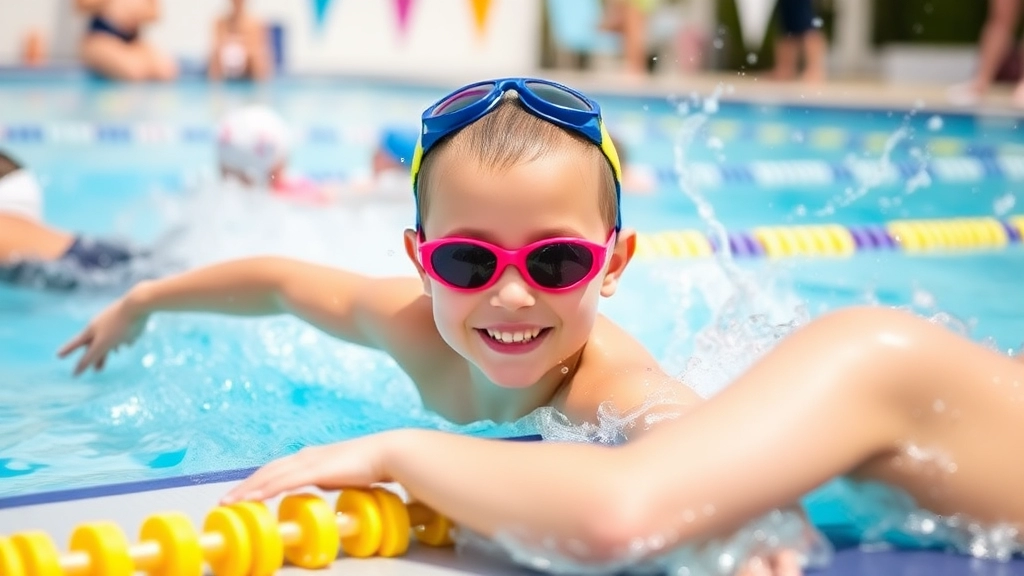
Alright, let’s dive into the meat of it: the Top Summer Swim Camps in the USA.
You’ve got a kid who’s passionate about swimming. Maybe they’re dreaming of the Olympics, or just want to improve their strokes. You’re wondering, “Where do I send them this summer?”
I’ve got you covered.
Here are the top picks:
Nike Swim Camps
- Locations: Nationwide
- Focus: Technique, endurance, and fun
- Perks: Access to top-notch coaches and facilities
Bolles Swim Camp
Ever heard of Ryan Murphy? Yeah, this is where he trained.
- Location: Jacksonville, Florida
- Focus: High-performance training
- Perks: Olympic-level coaching
Stanford Swim Camp
Want your kid to get a taste of Ivy League training?
- Location: Stanford, California
- Focus: Technique refinement and race strategy
- Perks: Training in Stanford’s world-class facilities
Auburn Swim Camp
Auburn’s swim team is legendary. Your kid could be next.
- Location: Auburn, Alabama
- Focus: Technique, starts, turns, and finishes
- Perks: Training with NCAA champions
University of Texas Swim Camp
Ever dreamt of training like a Longhorn?
- Location: Austin, Texas
- Focus: Stroke technique, starts, and turns
- Perks: Access to Olympic-level coaches and facilities
Michigan Swim Camp
Michigan’s swim program is top-tier. Here’s why:
- Location: Ann Arbor, Michigan
- Focus: Comprehensive swim training
- Perks: Training with elite college swimmers
SwimMAC Carolina
This camp is all about excellence.
- Location: Charlotte, North Carolina
- Focus: Stroke technique and race strategy
- Perks: Training with top US coaches
Total Performance Swim Camps
They promise total transformation.
- Location: Various locations
- Focus: Technique, endurance, mental toughness
- Perks: Small group sizes for personalized attention
Why These Camps Stand Out
- Expert Coaching: Learn from the best.
- Top Facilities: Train in world-class pools.
- Proven Track Record: Camps with a history of producing champions.
What to Pack for a Swim Camp
Alright, let’s dive right in. What should you pack for a summer swim camp? The keyword here is swim camp, and I’ll make sure you’re sorted from A to Z. Imagine you’re prepping for a week of intense training and fun â it’s crucial to have everything you need. Here’s a no-nonsense guide to help you pack like a pro.
The Essentials: Don’t Leave Home Without These
You’re probably wondering, âWhat are the absolute must-haves?â Here’s a quick list:
- Swimwear: Pack at least two swimsuits. Trust me, one isn’t enough when you’re in the water multiple times a day.
- Goggles: A good pair of goggles is a swimmer’s best friend. Bring a backup pair just in case.
- Swim Cap: Essential for keeping hair out of your face and reducing drag in the water.
- Towels: Pack a few â one for drying off and one for lounging.
- Flip Flops: You’ll need these for walking around the pool area and showers.
Clothing and Comfort: Stay Fresh and Ready
Now, you might be thinking, âWhat about when I’m not swimming?â Here’s what you’ll need:
- Casual Clothes: Think T-shirts, shorts, and comfortable clothes for downtime.
- Warm Layers: Even in summer, mornings and evenings can be chilly. A hoodie or light jacket will come in handy.
- Sleepwear: You’ll need something comfy for a good night’s sleep.
- Undergarments: Pack enough for each day, plus a few extras.
Training Gear: Boost Your Performance
To get the most out of your swim camp experience, make sure you have the right gear:
- Kickboard: Great for working on your kick technique.
- Pull Buoy: Helps improve upper body strength.
- Fins: Useful for various drills and improving speed.
- Water Bottle: Staying hydrated is key, especially with all that swimming.
Personal Care: Keep Clean and Healthy
You’ll want to stay fresh and healthy throughout camp, so don’t forget these:
- Toiletries: Shampoo, conditioner, soap, toothbrush, and toothpaste.
- Sunscreen: Protect your skin from the sun’s harsh rays.
- Bug Spray: Camps can be buggy, so keep those insects at bay.
- First Aid Kit: Basic supplies like band-aids, antiseptic, and any personal medications.
Extras: Little Things That Make a Big Difference
Finally, a few extras can make your camp experience smoother:
- Snacks: Healthy snacks for between meals and training sessions.
- Notebook and Pen: Jot down tips from coaches or keep a training journal.
- Books or Games: For downtime and relaxation.
- Camera: Capture memories and fun moments with your new friends.
If you’re looking for more detailed packing advice, check out our summer camp packing list essentials. Additionally, for those interested in a variety of camps, our guide to the top summer sports camps in Jacksonville, FL might be helpful.
Typical Daily Schedule at a Swim Camp
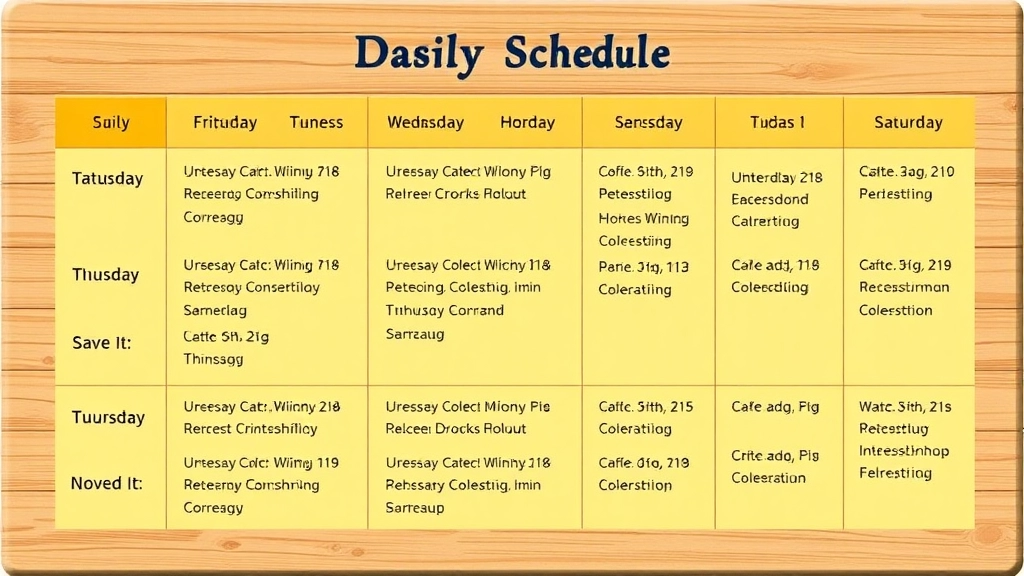
Ever wondered what a day at a summer swim camp looks like?
Let’s dive in.
Morning Routine
Kickstart the day with a splash.
- Early Rise: Most camps get you up around 7 AM. Rise and shine!
- Breakfast: Fuel up. Think high-energy foods like oats, fruits, and eggs.
- Warm-Up: Stretch those muscles. A light jog, some dynamic stretches, and you’re good to go.
Morning Swim Session
Time to hit the pool.
- Technique Drills: Focus on perfecting your strokes. Coaches break down each movement.
- Endurance Training: Build your stamina. Long swims to push your limits.
- Speed Work: Short, intense bursts. Improve your sprinting skills.
Mid-Morning Break
Grab a snack, hydrate, and relax.
- Snack Time: Fruits, nuts, or a protein bar. Keep it light but energizing.
- Hydration: Drink up. Water is your best friend here.
- Relaxation: Chill out for a bit. Maybe some light stretching or just hang with mates.
Midday Activities
Mix it up a bit.
- Dryland Training: Strength and conditioning exercises. Think push-ups, squats, and core workouts.
- Workshops: Learn about nutrition, mental toughness, or swim strategies.
- Team Games: Bond with your campmates. Relay races, water polo, or even a bit of volleyball.
Lunch Break
Refuel and recharge.
- Healthy Meal: Balanced diet. Proteins, carbs, and veggies.
- Rest Time: Take it easy. Maybe a quick nap or some downtime with a book.
Afternoon Swim Session
Back to the pool.
- Skills Practice: Focus on starts, turns, and finishes. Nail those details.
- Specialised Drills: Work on individual weaknesses. Personalised coaching tips.
- Cool Down: Gentle swim to relax those muscles. Prevents stiffness and soreness.
Evening Activities
Wind down the day.
- Fun Time: Social activities. Campfires, talent shows, or movie nights.
- Dinner: Another balanced meal. Keep it nutritious.
- Reflection: Review the day’s progress. Set goals for tomorrow.
Night Routine
Prepare for a restful night.
- Shower: Freshen up after a long day.
- Relaxation: Maybe some light reading or meditation.
- Lights Out: Usually by 10 PM. Get that beauty sleep.
Safety Measures and Protocols at Swim Camps
Worried about your child’s safety at a summer swim camp? You’re not alone. As parents, we want to ensure our kids are safe while they’re having fun. So, let’s dive into the nitty-gritty of safety measures and protocols at swim camps.
Why Safety is a Big Deal
Safety at swim camps isn’t just a checkbox; it’s the foundation of a successful and enjoyable experience. Camps that prioritise safety tend to have better reviews, happier campers, and peace-of-mind for parents. Here’s what to expect:
Comprehensive Staff Training
First off, qualified staff is non-negotiable. Camps should have lifeguards certified by recognised bodies like the Red Cross or YMCA. But it doesn’t stop there:
- CPR and First Aid: Every staff member should be trained in CPR and first aid. This is crucial for immediate responses to any incidents.
- Regular Drills: Camps often run safety drills to ensure everyone knows what to do in an emergency. This includes fire drills, swim safety drills, and evacuation procedures.
Rigorous Swim Tests
Before your child even touches the water, they’ll likely undergo a swim test. This helps the staff assess their swimming abilities and place them in the appropriate skill group. Swim tests typically include:
- Basic strokes: Freestyle, backstroke, and breaststroke.
- Treading water: To gauge endurance.
- Diving skills: For advanced swimmers.
Supervised Swim Sessions
You can breathe easy knowing that swim sessions are heavily supervised. Lifeguards and instructors are always on deck, keeping a close eye on the kids. Here’s how they do it:
- Buddy System: Campers are often paired up to keep an eye on each other.
- Rotating Shifts: Lifeguards rotate to stay alert and avoid fatigue.
- Headcounts: Regular headcounts ensure no one goes missing.
Health and Hygiene Protocols
In a post-pandemic world, health and hygiene are more critical than ever. Camps should follow strict protocols to keep everyone safe:
- Sanitisation: Regular cleaning of common areas and equipment.
- Health Screenings: Daily temperature checks and health screenings for campers and staff.
- Isolation Procedures: Clear steps for isolating and caring for anyone who shows symptoms of illness.
Emergency Action Plans
Every reputable camp has a detailed Emergency Action Plan (EAP). This plan covers everything from minor injuries to major emergencies. Key components include:
- Emergency Contacts: Quick access to parents’ and guardians’ contact information.
- Local Partnerships: Collaborations with nearby medical facilities for urgent care.
- Communication Protocols: Clear guidelines on how to communicate with parents during an emergency.
Real Stories, Real Assurance
Let’s keep it real. I’ve heard countless stories from parents who were initially anxious but found immense relief once they saw the safety measures in place. One mum shared how the camp’s rigorous safety protocols made her feel confident enough to send her child back year after year.
If you’re interested in more tips on ensuring a fun and safe camp experience, check out our cabin and bunk safety tips and learn more about key components of a summer camp registration form to ensure all safety measures are thoroughly covered.
Cost and Budgeting for a Swim Camp
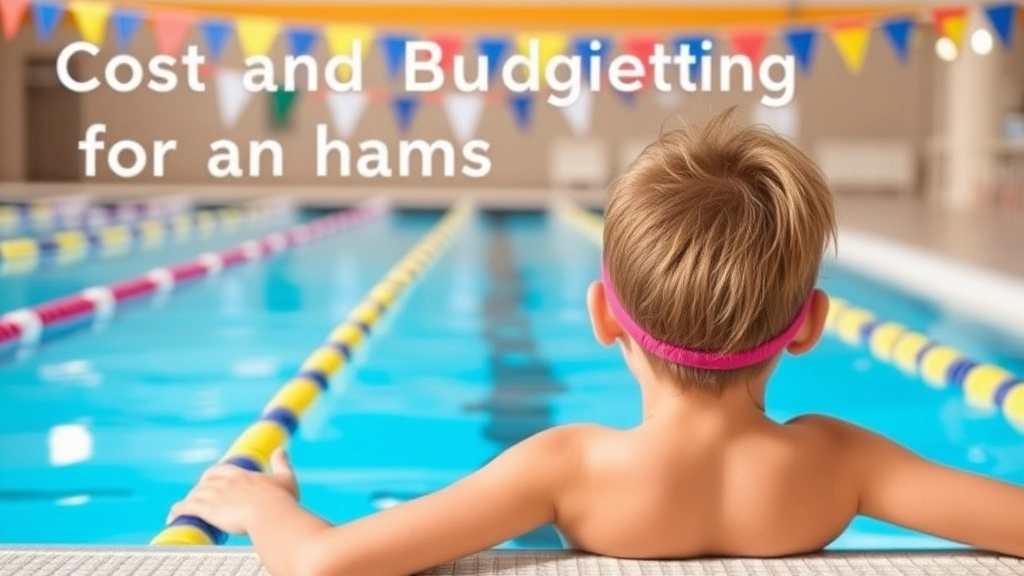
Alright, let’s talk about the elephant in the room: cost and budgeting for a swim camp.
You’re probably wondering, “How much is this going to set me back?”
Fair question. Swim camps can range from affordable to “Whoa, that’s a lot!”
Here’s the breakdown:
- Basic Camps: These are your no-frills options. You get the essentials—training, accommodation, and meals. Expect to pay around £300-£500 per week.
- Mid-Range Camps: A step up. These camps often include extra activities, better facilities, and sometimes even a few guest coaches. Think £500-£800 per week.
- Elite Camps: Top-tier all the way. You’re looking at high-end facilities, world-class coaches, and maybe even some one-on-one training. These can go from £800 upwards to £2,000 per week.
But wait, there’s more!
It’s not just the camp fee. You’ve got to think about:
- Travel Costs: Flights, trains, or petrol. It adds up.
- Gear: You’ll need swimsuits, goggles, and maybe some specialised equipment.
- Extras: Pocket money for snacks, souvenirs, or emergencies.
How do you budget for all this?
- Start Early: The earlier you plan, the better you can spread out the costs.
- Look for Discounts: Some camps offer early bird specials or sibling discounts.
- Fundraising: Get creative. Car washes, bake sales, or even crowdfunding can help.
Real Talk:
When I was a kid, my parents did a mix of saving and fundraising to get me to camp. It wasn’t easy, but it was worth it. And hey, if they could do it, so can you.
Pro Tip:
Make a checklist of all potential expenses. It helps to see the big picture.
Quick Recap:
- Basic Camps: £300-£500 per week
- Mid-Range Camps: £500-£800 per week
- Elite Camps: £800-£2,000 per week
- Additional Costs: Travel, gear, and extras
Final Thought:
Investing in a swim camp is an investment in your child’s future. Plan smart, budget well, and it’ll be a smooth dive into an unforgettable experience.
Testimonials and Reviews from Past Campers
Thinking about sending your kid to a summer swim camp but not quite sure if it’s worth it? Let’s dive into some real testimonials and reviews from past campers. Trust me, these firsthand experiences can make all the difference when you’re on the fence.
Real Questions and Worries
- “Will my child really improve their swimming skills?”
- “Is the camp environment safe and supportive?”
- “What if my child feels homesick or out of place?”
These are just a few of the concerns that parents like you have. So, let’s get some answers straight from the sourceâthe campers themselves.
Genuine Testimonials
Emily, Age 12:
“I was super nervous about going to swim camp. But the coaches were so friendly and made me feel right at home. I learned new techniques that I never thought I could master. Plus, I made some amazing friends!”
Jake, Age 14:
“Honestly, I thought swim camp would be all work and no play. But it was the perfect mix of training and fun activities. My freestyle improved a lot, and the evening games were a blast!”
Sophia, Age 10:
“I was scared of being away from home, but the camp counsellors were really nice and checked on us all the time. I even won a little competition they had at the end of the camp. It was the best summer ever!”
Common Themes in Reviews
- Skill Improvement: Almost every camper mentions how much they improved. Whether it’s mastering a new stroke or shaving seconds off their time, the progress is real.
- Supportive Environment: The coaches and counsellors get rave reviews for their supportive and friendly demeanour. This kind of environment is crucial for kids to feel comfortable and thrive.
- Fun and Friendship: Beyond swimming, the camps offer a range of activities that help kids bond and have fun. From evening games to talent shows, there’s never a dull moment.
Key Takeaways
- Improved Skills: Your child will return with better swimming techniques and more confidence.
- Safe and Supportive: The environment is designed to be nurturing and secure, so you can have peace of mind.
- Fun and Social: Camps offer a balanced mix of training and fun, ensuring your child has a memorable experience.
Linking to Other Sections
If you’re still on the fence, check out our section on Summer Camp Counselor Duties and Responsibilities to ease any lingering worries. Or perhaps you’d like to know What to Pack for a Summer Camp to get fully prepared.
Preparing Your Child for Swim Camp
Worried about sending your child to swim camp?
You’re not alone.
Many parents have questions about how to get their kids ready for this exciting adventure.
Let’s dive in.
Understanding the Basics
First things first: What exactly should you expect from a swim camp?
Here’s the scoop:
- Skill Levels: Camps cater to all levels, from beginners to advanced swimmers.
- Focus Areas: Technique improvement, endurance, or just having fun.
Tips to Get Your Child Ready
Ease those nerves with these practical steps:
-
Talk About It:
- Discuss what camp will be like.
- Share any of your own camp stories.
-
Visit the Pool:
- Familiarise them with swimming routines.
- Practice basic strokes if needed.
-
Pack Together:
- Create a checklist of essentials.
- Let them choose their favourite swim gear.
-
Set Goals:
- Encourage them to set personal goals.
- Celebrate small achievements.
Common Concerns
Let’s tackle those worries head-on:
- Safety: Camps have strict safety protocols. For more details, check out our guide on swimming fun and safety tips.
- Homesickness: It’s normal. Encourage making new friends.
- Skill Level: Coaches tailor activities to individual needs. Learn more about the different types and features of summer camp cabins to help your child feel more at home.
Real Stories
I remember my first camp.
Nervous? Absolutely.
But I met a coach who changed my swimming game forever.
Your child might just find their own inspiration.
Frequently Asked Questions about Summer Swim Camps
What are the benefits of sending my child to a summer swim camp?
Summer swim camps offer numerous benefits including skill improvement, physical fitness, social skills, independence, fun and adventure, mental toughness, expert guidance, lifelong skills, academic benefits, and memorable experiences.
How will my child’s swimming skills improve at camp?
Children receive intensive training with professional coaches, focusing on techniques like strokes, starts, and turns. This dedicated practice helps them level up their swimming skills significantly.
Are there any physical fitness benefits to attending a swim camp?
Absolutely. Swimming is a full-body workout that builds strength, endurance, and cardiovascular health, making it an excellent way for kids to stay fit.
Can my child make new friends at swim camp?
Yes, swim camps are great for socializing. Kids bond over shared interests, learn teamwork, and build lasting friendships.
Will my child learn to be more independent at swim camp?
Yes, being away from home teaches kids responsibility, self-reliance, and boosts their confidence as they manage their own schedules and belongings.
What kind of fun activities are available at swim camps?
Aside from swimming, camps offer a variety of fun activities like games, relays, and sometimes even water slides, ensuring a balanced mix of hard work and fun.
How do swim camps help build mental toughness?
Swim camps challenge kids to push through tough workouts, fostering resilience, focus, and discipline.
What kind of coaching can my child expect at a swim camp?
Children receive guidance from professional coaches who provide personalized feedback and tips that are often not available in regular swim lessons.
Are swimming skills learned at camp useful beyond the camp itself?
Yes, swimming is a life skill that enhances safety and can be enjoyed as a lifelong hobby.
Do swim camps offer any academic benefits?
Yes, regular exercise from swimming boosts brain function, improves focus, and helps kids learn time management by balancing camp activities with rest and fun.
What are some of the top summer swim camps in the USA?
Some of the top summer swim camps include Nike Swim Camps, Bolles Swim Camp, Stanford Swim Camp, Auburn Swim Camp, University of Texas Swim Camp, Michigan Swim Camp, SwimMAC Carolina, and Total Performance Swim Camps.
What does a typical day at a swim camp look like?
A typical day includes an early rise, breakfast, morning swim sessions focusing on technique and endurance, mid-morning breaks, midday activities like dryland training or workshops, lunch breaks, afternoon swim sessions, evening activities, dinner, and a night routine.
How much does it cost to attend a swim camp?
Costs vary widely. Basic camps can range from £300-£500 per week, mid-range camps from £500-£800 per week, and elite camps from £800 up to £2,000 per week. Additional costs may include travel, gear, and extra spending money.
How can I budget for a swim camp?
Start planning early, look for discounts, and consider fundraising options. Make a checklist of all potential expenses to manage your budget effectively.
Is investing in a swim camp worth it?
Investing in a swim camp is an investment in your child’s future. With proper planning and budgeting, it can be a smooth dive into an unforgettable and beneficial experience.
References
-
10 Benefits of Swimming
-
The Benefits of Swim Camp
-
How to Choose the Best Swim Camp for Your Child

